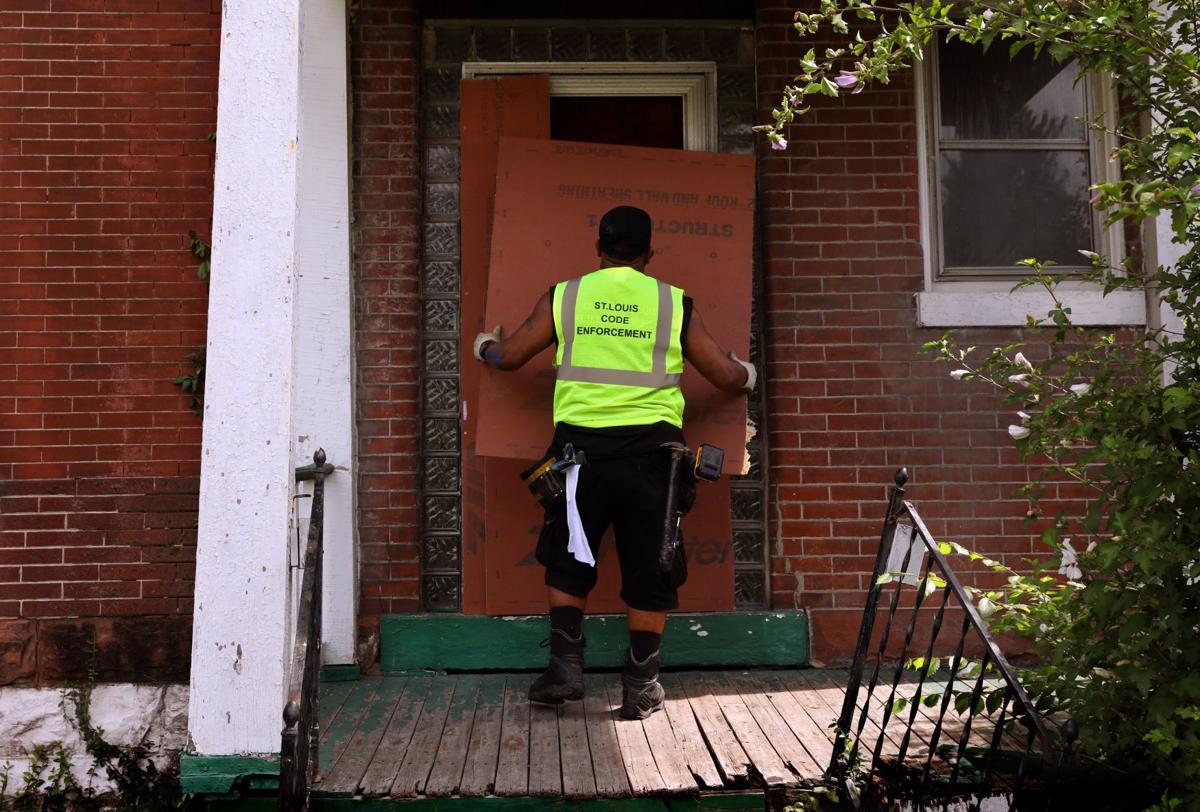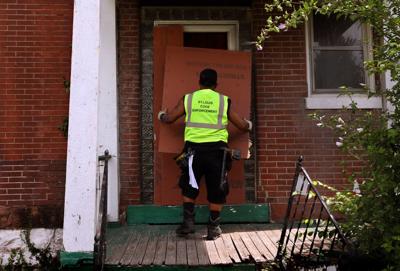Among the estimated 25,000 vacant properties in ├█č┐┤½├Į, more than half are still privately owned.
Most will sit and continue to deteriorate for five, six, maybe seven years before theyŌĆÖre offered to the public for sale because of unpaid taxes. If no one wants them, the cityŌĆÖs land bank, the Land Reutilization Authority, will take ownership ŌĆö unwanted properties in distressed neighborhoods that have the added burden of another half-decade of neglect.
As City Hall looks at ways to better manage vacant properties ŌĆö a top priority for Mayor Lyda Krewson ŌĆö the ├█č┐┤½├Į collectorŌĆÖs office could play an important role. It sits at the center of the process that moves property back into private hands or into the LRA.
While state law allows the ├█č┐┤½├Į collector of revenue to take action to collect unpaid property taxes after one year of nonpayment, in practice, it waits for three years of unpaid taxes before starting that tax foreclosure process. With other notice and court requirements, the process can stretch out for another year or more.
People are also reading…
The internal policy shows the complicated balance between protecting property rights, addressing vacant nuisances and the needs of an elected official ŌĆö Collector of Revenue of Gregory F.X. Daly ŌĆö independent of City Hall and reliant on fee income that accrues for each year of unpaid taxes.
ŌĆ£We have learned in the 50 years that LRA was created that this is the time that is needed for people to clear up issues in the family as far as the property is concerned,ŌĆØ said Deputy Collector Tom Vollmer. ŌĆ£I get it. We just walk this tightrope because you donŌĆÖt want to take property away from individuals, but yet you have to make quality of life for the rest of the people living there attractive.ŌĆØ
Some neighborhoods may be beyond saving; others need help now.┬Ā┬Ā
The lag time in the cityŌĆÖs system to process abandoned property has been cited in two reports examining ├█č┐┤½├ĮŌĆÖ vacancy problem, in a 2016 Center for Community Progress report and the next year in an on the LRA.
The , which studies vacancy in American cities, recommended reducing the time initiating delinquent tax enforcement actions.
ŌĆ£The suggestion is: Why donŌĆÖt you foreclose on it sooner? Because if someoneŌĆÖs not going to pay their taxes in year two, theyŌĆÖre not going to pay their taxes in year four, which isnŌĆÖt always true,ŌĆØ LRA Director Laura Costello said in a September interview. ŌĆ£But foreclose sooner so, A, you know, youŌĆÖll get people into court, youŌĆÖll wake them up sooner ... And No. 2, if the city would foreclose in year three, LRA would have properties that have only been sitting vacant for three years versus five.ŌĆØ
While the LRA may be preferable to an absentee owner, or one who has written off the property, Costello also noted her agencyŌĆÖs struggle to afford maintenance on the properties it already owns ŌĆö almost half of the cityŌĆÖs estimated 25,000 vacant properties ŌĆö with limited resources.
Dale Sweet, an attorney with Beck, Ostrom, Sweet who is an expert on local tax foreclosure laws, also questioned whether loading the LRA up with more properties by initiating earlier tax foreclosure would help. He noted that the collectorŌĆÖs top mission is to collect revenue and using the tax foreclosure process to address ├█č┐┤½├Į vacancy ŌĆ£is kind of like using a paint brush to mop the floor,ŌĆØ Sweet said.
ŌĆ£I think the general notion is Americans have property rights and we donŌĆÖt go around depriving people of their property through eminent domain or tax foreclosure without giving you every chance possible,ŌĆØ Sweet said.
However, Peter Hoffman, an attorney with Legal Services of Eastern MissouriŌĆÖs Neighborhood Vacancy Initiative, said there could be ways to use the process to get problem properties out to auction faster. HeŌĆÖs leading a task force examining the tax foreclosure laws with the hope of producing recommendations on policy changes that could help in the overall effort to reduce the cityŌĆÖs vacancy.
ŌĆ£We want to be able to make the argument to the collector that this could be a more effective tool,ŌĆØ Hoffman said.
Maybe there could be an incentive program to get community development corporations to buy and rehab tax foreclosure properties, he said. Maybe state law changes on notice and other requirements could make investors ŌĆö and the title insurers and lenders they need ŌĆö more willing to risk their capital on property that has gone through tax foreclosure.
Yet Hoffman agreed that it would be ŌĆ£a pretty mammoth undertaking for a collector to try and foreclose more properties earlier in the process.ŌĆØ
The collector will initiate foreclosure earlier in the process if there is a problem property brought to its attention by an alderman or a neighborhood group, Vollmer said, using the problem property sale held once a year and run by attorney Matt Moak of the city counselorŌĆÖs office. Vollmer said he speaks frequently with Moak and the collectorŌĆÖs office works with them to address problem properties.
ŌĆ£If thereŌĆÖs a problem, weŌĆÖll move on it,ŌĆØ Vollmer said.
There are other ways the collectorŌĆÖs office could help with abandoned property. The Asakura Robinson report recommends the collectorŌĆÖs office waive the title fees it charges the LRA for processing property that goes unsold at the tax auctions ŌĆö an amount it estimated at roughly $100,000 a year when it was published in 2017. The LRA, another office created by state statute, is reliant on income from properties it sells back to private owners and doesnŌĆÖt receive any revenue from the city, a unique arrangement among city land banks.
Reducing its inventory is going to take changes in state law, additional staff.┬Ā
ŌĆ£ItŌĆÖs usually a suggestion when you meet with other land banks, itŌĆÖs usually their first suggestion,ŌĆØ Costello said. ŌĆ£If theyŌĆÖre not going to contribute (revenue) every year, then have them not be charging you fees.ŌĆØ
Vollmer, though, argued that ŌĆ£everything we collect is spelled outŌĆØ in state law and that the collectorŌĆÖs office, too, depends on fees for its revenue.
Maybe, though, keeping the number of properties that ever get to the LRA is the best way to help the agency. Hoffman said the vacancy task force is looking at trying to bring outside services to the table to help buyers with financing and to attract a larger pool of buyers.
Both he and Sweet, the other attorney, said title insurersŌĆÖ inconsistent treatment of tax-foreclosed properties can pose a major hurdle for those who are interested in rehabbing them.
ŌĆ£ItŌĆÖs no surprise that sometimes the buyers at the tax auctions are not always the buyers with the greatest credit history and paying taxes themselves,ŌĆØ Hoffman said. ŌĆ£Are there ways to make tax auctions more appealing to investors who have good reputations and have the resources and capital to do what needs to be done with the properties?ŌĆØ















